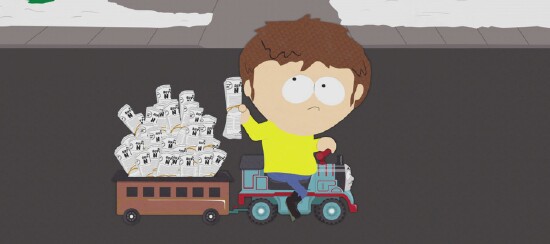This season, the show’s 17th, has been one of its best ever. That’s a remarkable achievement, but I digress ...
In the last original episode (which debuted two weeks ago), the gang’s stuttering, physically challenged classmate Jimmy Valmer – the editor of South Park Super School News, the school’s print paper – is confronted by PC Principal over his use of the word “retarded” to describe the school’s lunch policy. Despite PC’s slow burn, Jimmy asserts that he refuses to censor himself or anyone who contributes to his publication. PC fires back by banning the paper from the school. Jimmy retaliates by delivering it door to door throughout the town – then basks in the glow of success as the popularity of his print product unexpectedly grows by leaps and bounds.

Befuddled Butters’ dad is especially impressed. Lying in bed with his wife, who cannot tear herself away from her phone, he tells her how much he loves reading the paper. The dialogue given this character in this scene by series creators Trey Parker and Matt Stone – scary smart men of unlimited talent and imagination – is priceless and important and annoyingly familiar to us all.
“There are no ads, no sponsored content, no links to click on,” he says of the printed page. “Just news stories about what’s happening. Do you know how long it’s been since I was able to just sit back and read the news?
“I got so used to getting news off the Internet, but I feel like I’m always trying to chase the news somehow,” he continues. “It’s like I’m in a black void trying to reach the news story. But then the next thing I know I’m reading an ad for GEICO. So I click out of that and try to read the news story. But it’s not a news story. It’s a slide show. I’m looking at the worst celebrity plastic surgery jobs ever. So of course I want to see the next slide of plastic surgery gone wrong, so I hit the arrow.
“But then the arrow wasn’t there to take me to the next slide. It was to take me to an ad for face cream. I wanted to get a news story but I’m reading about face cream.
“I try to click out of it but the ad is following me! It’s following me all over the screen! So I click on the close button, but it wasn’t a close button, it was another slide show! And I just want to know what’s happening in the Middle East, but instead I’m looking at the Top 10 Scariest Movies of All Time! And that’s not the arrow for the next slide. It’s another ad!”
Speaking about the paper publication he says with much relief, “This is just news! And I don’t get lost in all the bullshit!”
The local television news catches on to the story, interviewing South Park citizens about their newfound love of print news.
“I read the Super School News because it don’t try and fool me and its news reports ain’t paid for by ad companies,” raves one.
“We just feel like this is actual news," says another. ">